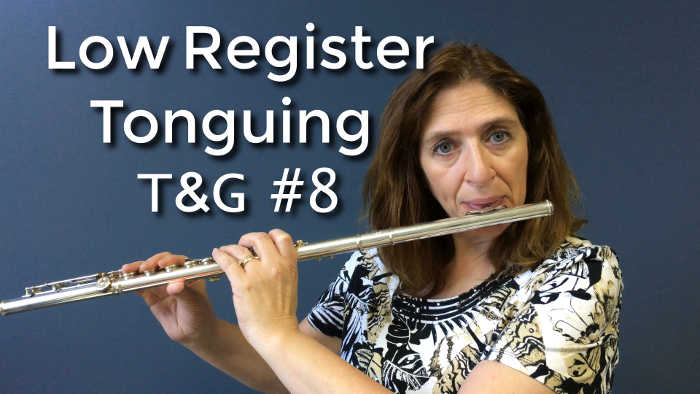If you have watched my flute tips or read my blog you will know that I like to practice low register short tones. They are invaluable to improving your tone in the low register and, dare I say, even better then long tones! I’m sure that I’ve learned more about my low register with low short tones then I have with the still-valuable long tones.
So, let me give you another exercise to practice your low register, that I find really valuable for me and my students: #8 in Taffanel and Gaubert. T and G’s # 8 is a series of arpeggios covering all the keys and using major, minor, diminished, and augmented. It is set up differently than #10 or #11 and lends itself to low register tonguing. When I work on this for low register tonguing, I only use A and B in all their keys. I only work on those 2 exercises because they stay low using low C or D.
This very exercise begins with a low C, which is the most difficult note to tongue short with a good tone. Generally, before you figure out low short tones, only a puff of air comes out. How frustrating!
It is your job to figure out how to play this low C with a warm rich tone, all while using a very short tongue. To do this begin with a deep breath of air where you fill up your stomach and rib cage. Then, with your tongue placed on the rough of your mouth feel the support (pressure) behind that tongue and you release the tongue but not the air. The air pressure you have generated stays inside.
Only use the air that is in your mouth – not more air pushed out from your stomach.
Keep the tongue very short. If you allow the tone to be of any length, you will fool yourself into thinking that the sound came out because you held it long enough for the tone to come out. When you tongue very short you will hear whether or not a puff of air came out or an actual tone. Re-tongue notes a few times to see if you can make the tone come out properly. They do get frustrating if especially if they’re not working but after daily practice on holding air in and only letting out the air in your mouth you’ll find that you are making progress.
Breathing and proper support are key to learning how to tongue in your low register.
If I am out of shape, this is not my go-to exercise. They will not come out. I need my lip to be working properly before I can attempt to work on these then my tone will benefit from this exercise.
A very nice side benefit of practicing low register short tones is that your upper register will also improve from working on your low. Now, isn’t that cool?!
Try T&G #8 just A and B tonguing short tones and holding your air in. Work on getting the best response that you can, especially on your low C. (Hey, If you can get low C you can get any note!) See how much this work really helps you to focus all of your sound on a short burst. It will help you in every register.
Have fun!
DoctorFlute
Watch me demonstrate this:
FluteTips 45 Low Register Tonguing Taffanel and Gaubert 8

Practice with Me Low Register Tonguing

FluteTips 46 Practicing Triple Tonguing in Reverse

FluteTips 19 Low Register Tonguing

FluteTips 47 Pizzicato Tonguing

